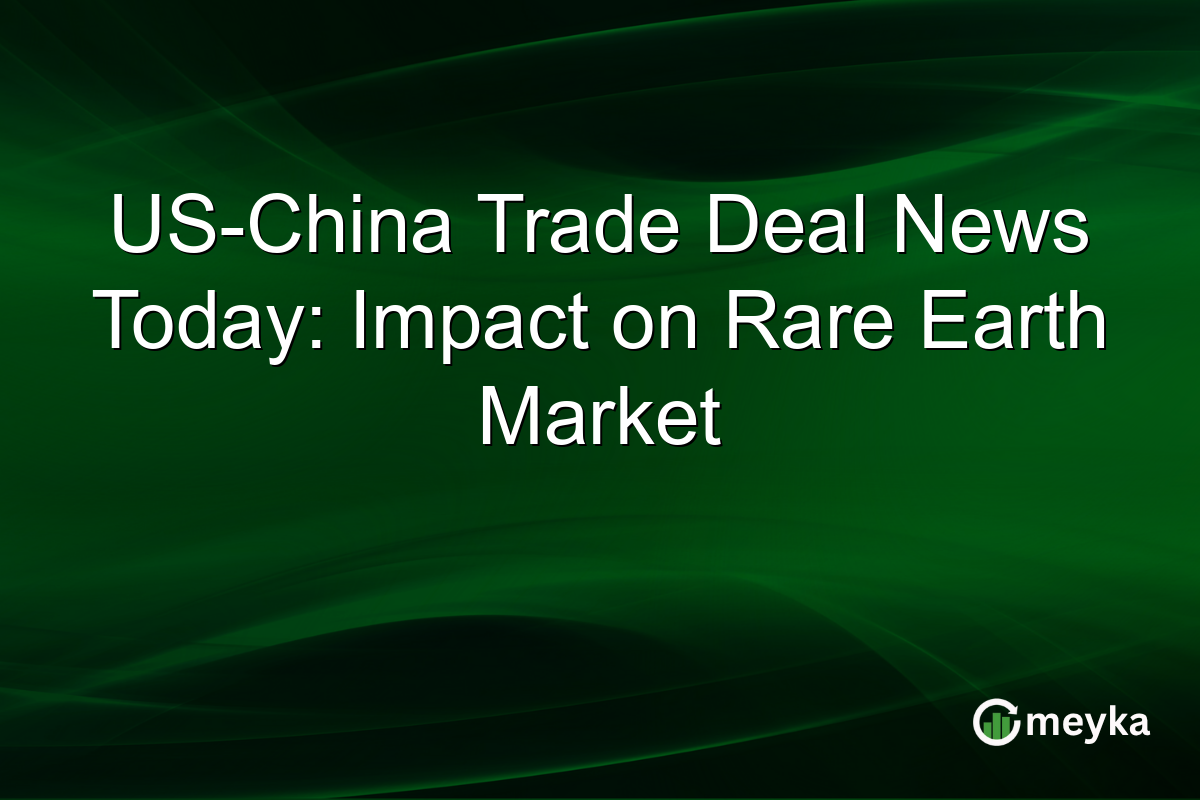US-China Trade Deal News Today: Impact on Rare Earth Market
Today, the US and China are making headlines with an emerging framework for a new trade deal. This pivotal agreement, ahead of the Trump-Xi meeting, sparks significant interest while promising to reshape the rare earth market. As two economic giants discuss trade tariffs and critical resources, investors are keenly focused on the long-term impacts.
The Framework of the New Trade Deal
The US-China trade deal framework aims to create a balanced economic partnership. At the core of discussions are trade tariffs, a sticking point in previous negotiations. Both nations are pledging a reduction in these tariffs, particularly on technology and agricultural products. This move is geared toward easing tensions and promoting mutual trade benefits. By mitigating the tariffs, the electric vehicle (EV) sector, among others, is likely to experience a boom, as costs could decrease significantly. Negotiations also touch upon regulatory structures, aiming to foster a competitive global market.
Focus on the Rare Earth Market
Rare earth elements are essential for modern technologies, including smartphones and EV batteries. Currently, China dominates the global supply, producing over 80% of these elements. The new US-China trade deal looks to establish a more diversified supply chain, reducing overdependence on Chinese resources. This includes potential collaborations on mining ventures outside of China and innovating recycling processes. Should these efforts materialize, companies in Australia and the US could benefit, opening opportunities for new leaders in rare earth production. Overall, the agreement could stabilize global supply and price fluctuations.
Impact of the Trump-Xi Meeting
The upcoming Trump-Xi meeting marks a critical moment for the trade deal’s finalization. Historically, these high-profile discussions have illuminated broader policy directions. Investors are optimistic that positive outcomes will lead to proactive measures, enhancing economic ties and geopolitical stability. This meeting is not only about negotiations but also signaling intent to the world market, potentially influencing stock prices and investment flows. Securing a path forward could bolster investor confidence and contribute to an upswing in market activities.
Trade Tariffs: A Double-Edged Sword
Trade tariffs have been a contentious issue in US-China relations. Their removal or reduction as part of this deal could benefit several industries by lowering costs and easing import-export activities. In contrast, hasty tariff changes could disrupt existing contracts and business strategies. Companies must navigate these shifts carefully to minimize risks. The automotive and electronics sectors, heavily reliant on both markets, are watching closely. As negotiations progress, tweaking tariffs could provide the leverage needed for a smoother global market transition.
Final Thoughts
In conclusion, the potential US-China trade deal represents more than just an economic agreement. Its focus on trade tariffs and rare earth elements could recalibrate global supply chains and economic dependencies. As Trump and Xi prepare to meet, the world watches with bated breath, anticipating a deal that might foster a more stable economic environment. Companies worldwide may need to adjust strategies promptly, seizing opportunities presented by these changes. The outcomes could significantly define global market trends and investor confidence going forward.
FAQs
The deal is crucial as it aims to diversify the global supply chain of rare earth elements, reducing dependency on China. This could lead to more stable prices and supply security, benefiting technology industries relying heavily on these materials.
Trade tariffs increase the cost of goods between countries, often leading to higher consumer prices and strained trade relationships. By negotiating tariff reductions, the US and China are attempting to boost trade and reduce economic tensions.
The meeting is significant as it signifies the willingness to resolve key trade issues. Successful negotiations could enhance market stability, boost investor confidence, and potentially lead to increased investment activity in affected sectors.
Disclaimer:
This is for information only, not financial advice. Always do your research.






